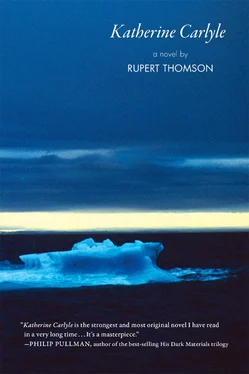“And you?” I say. “What are your plans?”
He shrugs. “My ex-wife lives in Bergen, with my children. I will visit them.”
“You have children?”
“Two boys. Six and nine.”
I ask if he has pictures.
He takes out a wallet and slides a small photo across the table. The nine year-old is the image of his father, with rugged features and crinkly rust-colored hair. The other one has a round smiling face and his hair is greenish blond. All of a sudden I can picture Olav’s ex. I think of the children on top of Mrs. Kovalenka’s TV, their soggy complexions, their matching fleeces. No one looking at them now.
“They’re lovely boys,” I say.
“Yes.” He turns the photo on the table and studies it dispassionately as if he has been asked to make some kind of appraisal. As if the children aren’t actually his.
“Will you take them sailing?”
He smiles faintly, bitterly. “Their father, the sea captain.”
“It’s not something to be ashamed of.”
“My ex-wife wouldn’t agree.” He sighs. “In any case, in Norway we sail only in the summer.”
“Of course.”
He looks at me and something tightens in his face.
“What’s wrong?” I ask.
“You look so different.”
“My hair, you mean? I know. I didn’t do a very good job, did I?”
“No.”
“It’s more appropriate — for my work. Besides, no one’s going to see me, are they, not out here.”
“I see you.”
Not sure what to say, I let my eyes drift past him. A man is sitting near the door, under a mural of a knight on a white charger. I think I recognize the man from the birthday party. He’s one of Gleb’s friends. Oddly, though, he doesn’t acknowledge me. No smile or wave. Not even a nod. When I look at Olav again he’s gazing down into his empty coffee cup.
“You look younger,” he says at last.
“Is that bad?”
“No, not bad. Only …” He tails off, unable to grasp hold of his feelings, uncertain how to put them into words.
“It will grow again,” I say.
He glances at me, as if he disagrees with this, then checks his watch. “I should be going.”
Outside, the air is sharp, abrasive. You could almost graze yourself on it. Light from the canteen windows lands on the square paved area in yellow slabs. As Olav walks to his snow scooter I notice that he’s limping. I ask if he has hurt himself.
“It’s sciatica,” he says. “I’m getting old.”
We embrace quickly. We’re wearing so many layers that it feels chaste and faintly humorous. He fits a pair of goggles over his eyes, then climbs onto the machine and turns the key in the ignition.
“You’re not old,” I call out over the urgent high-pitched buzzing of the engine.
He grins. “See you in April.”
The red glow of his taillight dissolves in the grainy darkness. It will take him at least three hours to get back. I hope he will be all right.
Standing in the cold, I think about Natasha and Klaudija, who I met in Longyearbyen. I should have asked Olav to call at the hotel and give them a message. They were good to me. I don’t want them to think I have forgotten them.
/
Not long after Olav’s visit I stay up late, leafing through my guide to Svalbard, the TV on in the background. Girls in glittery bikinis twirl behind a host who is more than twice their age, his hair peach-colored, his teeth all capped. I wonder which girl he’s sleeping with. If this was Italy, he probably would have had them all. Who watches these shows? I reach for the remote. In the sudden quiet after I turn the TV off I hear a sound I don’t recognize at first. When it happens again, I realize it’s my front door shaking in its frame, as if someone just collided with it.
I creep up the hall and peer through the Judas eye. My breath rushes into me, abrupt and shallow. Standing up against the door is Bohdan, the man I spoke to Zhenya about. I don’t dare move. He’s unshaven, as before, and the snow in his black hair is beginning to melt and trickle down his face. His cheeks are covered with a patina of grime. He looks like someone who was on fire and has only just been extinguished. Above his left eye is a deep cut in the shape of a crescent moon, the edges crusted and black. He brushes at the wound, smearing blood across his face, then he stares at the ground and mutters a few incoherent words. All I can see is the top of his head, the scalp showing through his thinning hair. He fought in Chechnya and his only reward was to lose his wife. Is it any wonder that he drinks?
Once, as if intent on catching me off guard, he tries to look through the Judas eye. Idiotic, of course, since that’s what Judas eyes are designed to prevent. In that moment, though, we’re only three or four centimeters apart, and my heart is beating so hard that I worry he might hear it. After a few long seconds he stands back and fiddles with the front of his jacket, then he swings away and walks into the stairwell. At last I can see the whole of him. His shoulders are wet — the green of his jacket has darkened to a sodden black — and snow sticks to the heels of his boots. His back still turned, he glances over one shoulder, in the direction of my door. He thinks he forgot something, perhaps, or that something changed while he wasn’t looking. His cracked lips move. He’s talking to himself again.
Standing near the stairs, he undoes his trousers, then he takes out his penis and stares at it, as if he wasn’t expecting to find it in his underpants and is wondering how it got there. A dark grayish mauve, it reminds me of certain vegetables — a beetroot when it is first lifted from the earth, or purple sprouting. He tries to masturbate but he’s too drunk to get an erection. Leaving his penis dangling outside his trousers, he reaches into his jacket pocket and brings out a bottle of vodka. He lifts the bottle to his mouth. The vodka lurches left then right as he takes two or three fierce gulps, then he lowers the bottle and wipes his mouth on his sleeve. His eyes veer towards my door again. I back away. This could go on for hours.
Later, lying in the dark, it’s hard to put the drunk man out of my mind. Noises keep coming from the corridor outside. The chink of glass on concrete, the shuffle of boots. Muttering, and more muttering. Shouting. Then a crash. He must have fallen over. I switch on Mrs. Kovalenka’s radio. The classical music station she used to listen to is playing a song cycle. I turn the volume down and leave it on all night.
In the morning I go and look through the Judas eye. The stairwell appears to be deserted. I crack the door open. Bohdan’s gone. The vodka bottle lies next to the wall, and there’s a pool of vomit on the floor. The poor man. He’s such a mess. What can I do, though?
/
The Moscow — Arkhangel’sk flight lands on time, and my father follows Lydia down the metal steps and across the tarmac. Outside the airport they climb into a waiting taxi. They have reserved a room at the Best Eastern Dvina, which is where I stayed. It’s not such a big coincidence; the city only has a handful of decent hotels. All the same, I wonder if my father can sense my presence as he walks towards reception. Is that what brings him to a halt halfway across the lobby?
“What are you doing, David?” Lydia says.
He pats his pocket, then appears to relax. “Sorry. I thought I left my passport in the taxi.” But he knows exactly where his passport is. He’s lying to her and he’s not sure why.
The next day, as they scour the city for evidence of me, they take a shortcut between some old wooden houses. Lydia stops by a window. Between the net curtains and the glass panes, arranged on the thin shelf of the sash, is a row of snow globes. Lydia suggests they go inside. Though my father is eager to keep moving he doesn’t want to seem inflexible or stuck in his ways — and it’s hard at this stage in their relationship to deny her anything. Reluctantly, he agrees. The two men are there, just as before, one folded into the armchair by the counter, the other curved against the shelves, oddly boneless. Despite himself, my father feels a stirring of curiosity. The atmosphere intrigues him. Something otherworldly, anachronistic. The tin-lined ceiling, the dark boards on the floor.
Читать дальше












